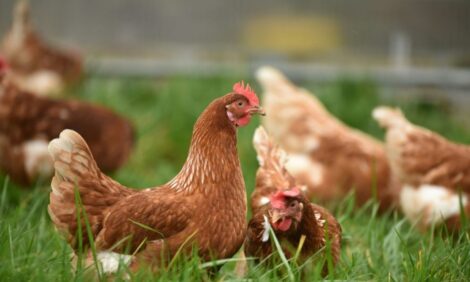



Phytogenic growth promoter, a promising alternative to antibiotics in poultry
Antimicrobial additives are commonly included in animal diets for growth promotion and control of diseases. The European Union and the US regulators banned feed antibiotic growth promoters due to not only drug resistance, but also to prevent the human consumption of drug residues through animal products.
Decreasing trend of feed antibiotics
Poultry feed devoid of synthetic chemicals or antibiotics is increasingly being popular in the developed nations. Consequently, the feed manufacturers are under regulatory pressure to reduce the use of antibiotic growth promoters and find alternatives.
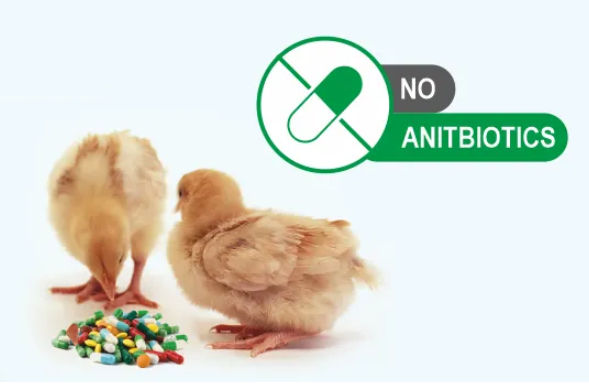
Worldwide use of antibiotics
It has been proposed that feed antibiotic usage was an integral part of this revolution in animal industry. It is estimated that 40 % of the antibiotics produced are used for livestock feed additives.
Why are antibiotics given to animals?
Animals in industrial scale facilities are routinely fed antibiotics to:
- make animals grow faster and bigger
- control the spread of diseases in animals
- prevent contamination of animal products with zoonotic pathogens
- increase survival of animals, however when antibiotics are overused, it can be hazardous to the human health
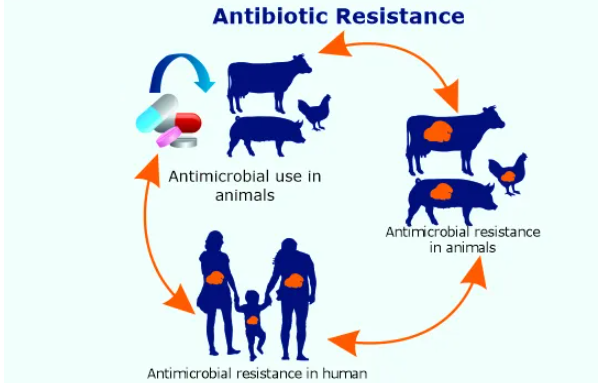
The threat of antibiotic resistance
According to the Centers for Disease Control, more than 2 million human illnesses and an estimated 23,000 deaths each year are the result of antibiotic resistance. Therefore, antibiotic growth promoters are discredited by consumer associations as well as by scientists.
Risks associated with drug resistance and superbugs
Antimicrobial resistance is a naturally occurring phenomenon that can be slowed, but not prevented. Over the decades, germs such as bacteria, viruses, parasites and fungi adopt to the medicines that are made to kill them. This makes previously standard drug range less effective, and sometimes ineffective.
Number of incidences suggests that giving healthy animals regular antibiotics can contribute to the worsening health crisis of the resistance and creation of the deadly superbugs. Superbugs are strains of pathogens that are resistant to common antibiotics and other treatments used to treat the infections they cause.
Post-outbreak medication has had variable effectiveness, but would certainly be less effective due to use of subtherapeutic levels of antibiotics.
Phytoactives, sustainable alternatives as non-antibiotic growth promoters for poultry
The feed manufacturers are adopting new forms of natural feed additives that are the products of modern science. This new generation of growth enhancers include botanical additives like appropriate blends of plant extracts. The extracts used as feed additives include many different bio-active ingredients such as alkaloids, bitters, flavonoids, glycosides, saponins, and tannins.
The extracts act on the appetite and intestinal microflora, stimulate the pancreatic secretions to increase endogenous enzyme activity and immune system. Many plant products and their constituents have a broad antimicrobial activity, antioxidant and sedative properties.
Besides this, scientists recently discovered that the appetizing and stimulating activity of plant extracts on animal digestive and immune system could benefit performance and health of farm animals. They postulated that these effects could be due to the increased production of digestive enzymes and the improved utilization of nutrients.
Extensive use of low-level antibiotics in feeds has brought about concern for potential harmful effects due to development of resistant strains of organisms in host animals that might compromise animal as well as human health.
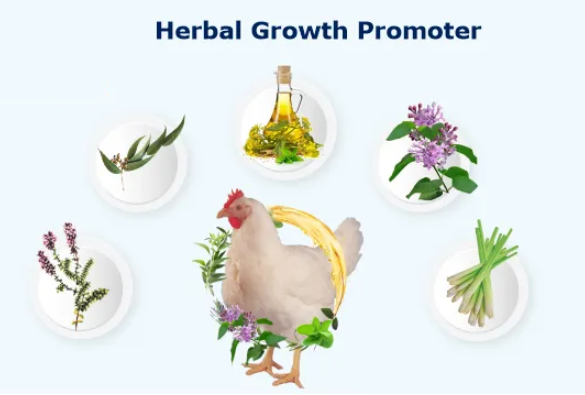
Herbofloxin, A natural growth promoter
A unique micro-emulsified formulation of phytoactive ingredients such as Thymus vulgaris, Eucalyptus, Syzygium, and Citronella. Herbofloxin improves gut immune barrier to resist colonization by pathological microflora.
Thymol, eugenol, and essential oils inhibit enteropathogen like Salmonella and E. coli in the digestive tract. Phytoconstituents of antibacterial nature target gut pathogens including important zoonotic bacteria. The improved gastrointestinal microclimate favors digestibility and uptake of nutrients. Phytomolecules with immunomodulatory effects stimulate growth of immune organs such as spleen, thymus and bursa, improving the number and function of lymphocytes, macrophages and natural killer calls. Positive effect on hemopoietic system improves efficient muscle oxygenation and feed conversion by promoting the activity of digestive enzymes.
It is important to note that poultry bacteria include a wide variety of human pathogens, such as Escherichia, Salmonella, and many other notable pathogenic genera. This zoonotic organism can be a public health hazard if consumed through contaminated meat. Herbofloxin reduces harmful intestinal load and ultimately prevents the meat contamination.
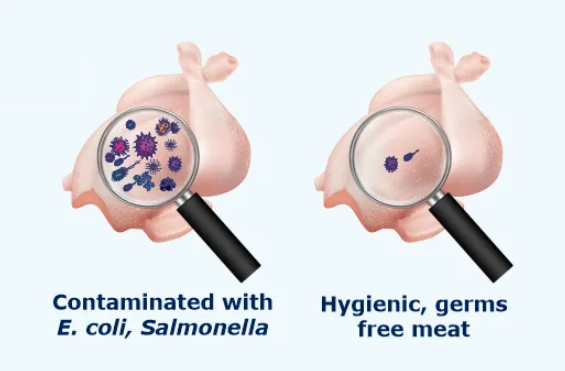
Benefits
- Antimicrobial activity
- Stimulation of the immune system
- Antioxidant and anti-inflammatory activity
- Stimulation of feed intake and digestive secretions
- Improves blood and serum parameters such as hepatic and digestive enzymes
- A tool for antibiotic free chicken program
Economic features
- Higher weight gain
- Improves egg production in layer
- Improves nutrient utilization
- Improves carcass traits
Usage recommendation is 250 – 500 ml per 1000 liter of drinking water in the growing and finishing phase of broilers. Herbofloxin is a natural non-antibiotic growth promoter for environmental friendly and lead to sustainable poultry farming.










